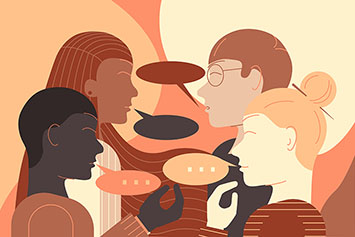
When I finally got sober and started taking my prescribed medications correctly, I felt like I had a chance at life again. I was inspired by the 12-step programs and began to realize there was a mental health movement happening in my peer community — one that provided tools for recovery. I learned that, someday, I might even be able to work as a peer support specialist. So, as I began my recovery journey, I held onto that aspiration.
Turning My Life Around
I started off my job search with no real resumé, having worked less than a year in my entire life. I was turning 30, and I still had no idea how to communicate clearly or professionally. Sometimes, it felt like, “Uh…you wanna get some beer?” was about all I knew how to say. It took me some time to join the world around me and find meaningful passions and connections. I started volunteering places. I joined a project where we presented our recovery stories to other groups like nursing students and social work interns. I joined the community mental health board.
As I took on these new tasks and challenges, I warmed up to the society I once rejected. The fact that I could create positive change made it worth it. My peers helped me see that there was a great life waiting for me. The community began to see my value — and I did, too.
Gaining Momentum and Reflecting
As I tackled the challenges in front of me and made strides in my recovery, I couldn’t wait to share what I had with anyone who could benefit. After all, I had the experience of developing a formula that worked for me: get active, join a social group that is part of something positive, build a resume volunteering.
This path allowed me to escape a sedentary lifestyle — one in which I was always using drugs or trying to get drugs. One in which I was chasing away the voices with alcohol, committing small crimes and rejecting everything that didn’t reinforce my self-destructive lifestyle. This lifestyle landed me in psychiatric hospitals for months at a time (seven visits in total). But now, I understood that there was a way out. I could find both peace and freedom.
Acknowledging The Impact of Peer Support
I would never have “made it” without my peers who blazed this trail. Knowing I could follow in their footsteps — emulate their paths to recovery and even go on to help others myself — was amazing. I wanted to help people find their way out of darkness like I did. Beyond that, I wanted them to make it all the way to the other side, believing we could each actualize our visions.
Today, I feel like peer support has the power to bring us all closer to our dreams. I encourage my peers to never underestimate our potential or limit our goals. While “I just want to keep taking my meds,” or “I want to stay out of the hospital this year,” may seem like good starting points, there is so much more we can aspire to.
Transforming a Broken System
I am not any “further down the path” than anyone else. Some may excel in one particular area, and I may excel in another. I may need their help, or they may need mine. The point is that recovery is contagious. We just need something to be inspired by and excited about. In this case, it is sharing our triumph, our survival. Transforming a system that may have let us down and handing down what was given to us.
Today, I work with my peers, and we volunteer with local projects and plan our own volunteer activities. We plan recovery events for the larger mental health community. We reach out to our neighbors. We are a part of the world and society. We fight stigma every day.
To me, peer support is more than a job where you expose people to recovery. We have the chance to inspire. The people we join inspire us. Our energy, as a collective, branches out to our community. We may have had setbacks, but we come out ahead as leaders, sharing valuable experiences that can bring healing to the rest of society.
Patrick Kaufmann’ s story is featured in NAMI’s first-ever book, “You Are Not Alone: The NAMI Guide to Navigating Mental Health,” which was released on Sept. 20. You can order the book here.

